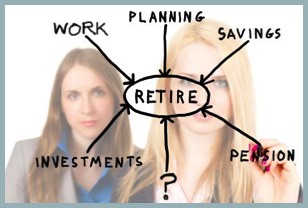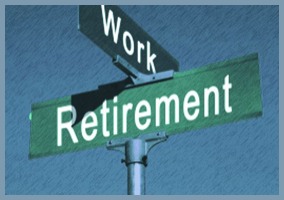- Planning
Planning for retirement
With changes to the law meaning the default retirement age of 65 is to be abolished, this means it is now up to us how long we choose to work for before deciding to retire, and many more people will be opting for an early retirement.
Though the government will still determine the age at which we receive our state pension, we will now be able to retire when we consider the time to be ‘right’. But how will you know if and when the time is ‘right’, and more importantly, what do you plan on doing with your newfound freedom?
Whilst we are toiling and stressing at work for all of those years, we often joke about looking forward to retirement age and living the life of luxury.
Nowadays we are advised to begin investing in our pension and retirement funds early on, and spend most of our working lives planning out the financial aspects of retiring to ensure that we have enough income to provide for our needs in the future, whatever retirement age we choose.
However, whether you go for an early retirement age or not, generally very little thought is given to the personal aspects of retirement, and how this huge transitional period, undeniably one of the biggest in our lives, will affect us on a psychological and emotional level.
Though retirement does offer the opportunity to lead a full and satisfying life, many individuals have an idealistic picture of what it will be like, which is very different from what they really experience when the time does come for them to leave the workforce, which makes a retirement plan very important prior to retiring. - Negative Effects
The negative effects of retirement
Individuals in retirement and even early retirement often struggle to adjust to their new lifestyle, and instead of leading the ‘ideal’ life they had in mind, find themselves struggling to adjust to the following:
Loss of social relationships
Whilst at work we tend to take basic human interaction for granted. Even if we work in an environment where we don’t do much talking, the feeling of being around others and interacting with them is a comfort that we don’t experience whilst at home on our own.
Many individuals also find that over time some of their working relationships with colleagues develop into meaningful and close friendships. Unfortunately, one half of the friendship moving into retirement can mean that schedules and commitments make it challenging to maintain that same level of closeness.
If retirees who do feel this way do not address the issue and seek help, feelings of isolation, loneliness, and in some cases depression can develop.
A decline in overall health
Though there is no conclusive evidence proving that after retirement our health declines significantly, some individuals slip into the stereotypical retirement model of spending too much time on the sofa reading the paper and watching TV.
Many of us underestimate how much exercise we obtain from working. Whether its walking to work, walking up flights of stairs or just generally meandering around the office, this is all exercise we won’t be getting when we retire.
Though it is inevitable that our physical mobility will decline as we age, it is still important to remain as physically active, supple and mobile as possible to promote healthy ageing and optimum well-being.
Individuals who are struggling to adjust to their retirement may also find that they lose motivation to stay healthy and active and instead slide into a sedentary lifestyle.
Individuals who don’t participate in any physical activity may find that this leads to weight gain and this could subsequently contribute to poor health.
Family and marital relationship issues
Relationships with your family and spouse can be a great source of stress once you have retired.
The idea of spending as much time as you like with your loved ones may initially seem like the ideal situation, but there are a series of points to consider. For instance, how will you partner respond or be influenced by your retirement? Are you retiring together, or are you joining or being joined by a spouse who is about to retire or who is already retired?
Whatever the scenario, you will need to consider how yourself and your family will react to spending such a large amount of time together, and a discussion about how much time you would like to spend together and apart will be necessary.
Loss of identity
Though our jobs don’t define who we are, they do reflect our interests and passions and they also continually present us with challenges that keep our minds stimulated.
Whether we intend them to or not, jobs become a huge part of who we are. The majority of us strive to do well in our positions, come to think of ourselves as an integral ‘cog’ in the company we work for, and often look to our jobs to provide respite and a distraction from other areas of our lives that may be causing distress.
When you take all of the above into account, its no surprise that upon withdrawing from the workforce, some individuals feel they have lost a sense of their identity and purpose. - What steps can I take?
What steps can I take to ensure a fulfilling retirement?
If your retirement is looming and you are beginning to feel anxious about how you will spend your leisure time then it may be time to start giving this some consideration and possibly making a pension plan and retirement plan.
When you do give up work, the routine you had fixed in place which revolved around your job will change completely, often leaving retirees not really knowing what to do with themselves.
The formation of a new routine is key to those who are entering into retirement, as is substituting the benefits obtained through working by continuing to remain socially and physically active, by facing new challenges and by keeping the mind stimulated through new outlets.
Below are some suggestions of ways that retirees could spend a proportion of their time whilst also introducing structure and routine into their lives. These activities also offer ways to keep the mind stimulated and the body active.
Decide on your retirement age
If you are unsure about what age you want to retire, it is worth speaking to your pension provider to find out how much money you would receive at the different ages you are contemplating retiring at. Often, the difference a few years makes is not enough to keep you working when you have had enough! Other factors will come into what age you retire such as whether you are ready to start spending more time with your family, you want to go away on the trip of a lifetime or your job is getting you down and you are not sure what else you want to be doing.
Volunteering
Volunteering is an extremely rewarding way to spend time for those who wish to give something back to their community.
Retired volunteers have the benefit of year’s worth of life experience and a specialist skill set built up during employment to bring to the table. It is these skills that are valuable to voluntary organisations, many of which need experienced volunteers to help them deliver their services.
There is a volunteering position out there to suit everyone, from befriending schemes or working on environmental projects through to a regular position at a local charity shop. Volunteering offers a platform for socialising and meeting new people and has the indisputable additional benefit of being gratifying.
If you are interested in volunteering and would like to find opportunities in your area, please visit Direct Gov’s volunteering page.
Part time employment
Whether you require some extra disposable income, or if you miss the environment and challenges of working life, part time employment is an excellent option for retirees who still wish to use the skills they spent years developing whilst in full time work.
A part time job could provide extra income, routine, stability, challenges to keep your mind active and the opportunity to meet and form new friends, all without the responsibility and pressure of a full time job role.
Find a hobby
Retirement is a fantastic opportunity to start doing all of those things you have wanted to do but never got round to doing before. From traveling the world to taking up ballroom dancing lessons, hobbies are a great way to socialise whilst spending time doing the things that you love.
Physical hobbies such as golf, swimming, dancing and cycling will help to ensure that your physical health remains at its optimum level, whilst creative hobbies such as gardening, photography, knitting, backing and arts and crafts will challenge the mind and keep it active.
Remain socially active
If you live alone or with just your spouse then make the effort to put yourself out there and socialise with others. From organising a weekly supper evening with friends, through to joining a local book club or signing up to your local social club, widening you social circle could really contribute to a happy retirement. - How Life Coaching can help plan
How could a life coach help me to plan for my retirement?
Preparing yourself for the life changes that are to come is one of the best ways to prevent negative outcomes, and this is where the expertise of a professional life coach could come into play, whether it is help with creating a retirement plan, pension plan advice, or helping with retirement ideas for when you stop working.
A life coach is there to help you to resolve any fears you may have over retirement as well as preparing you for the transition, and assisting you with the development of a life plan and goals.
A life coach specialising in retirement could help you to establish a clear vision of what it is you wish to do during your retirement and may begin by asking you a series of questions similar to the following:- What are your feelings towards retirement?
- How do you want to spend your retirement?
- What expectations do you have?
- What lifestyle changes would you like to have when you are retired?
 The answers you provide to these questions will help your coach to establish a clear picture of how you feel and what you want from retirement at that moment in time, and will form the basis of the framework with which you will move forward.
The answers you provide to these questions will help your coach to establish a clear picture of how you feel and what you want from retirement at that moment in time, and will form the basis of the framework with which you will move forward.
Regular coaching sessions in the lead up to your retirement, or during your retirement, could help you to identify any fears you may have so they can be resolved. Coaching can also help you to understand your key motivations, values, skills and interests so that clear picture of what you want from your life after retirement can be obtained, and a purposeful retirement plan can be formulated.
Close Menu
